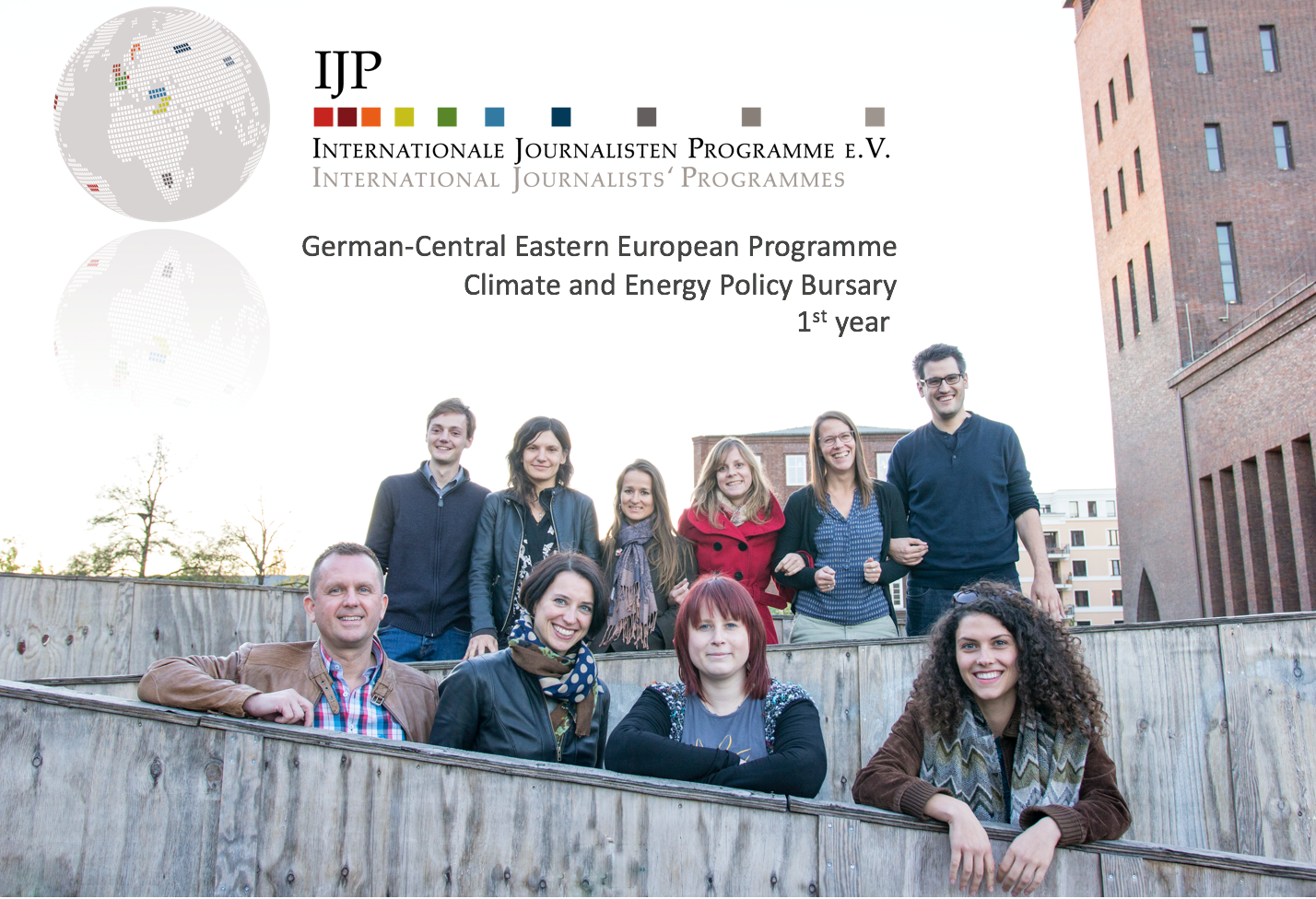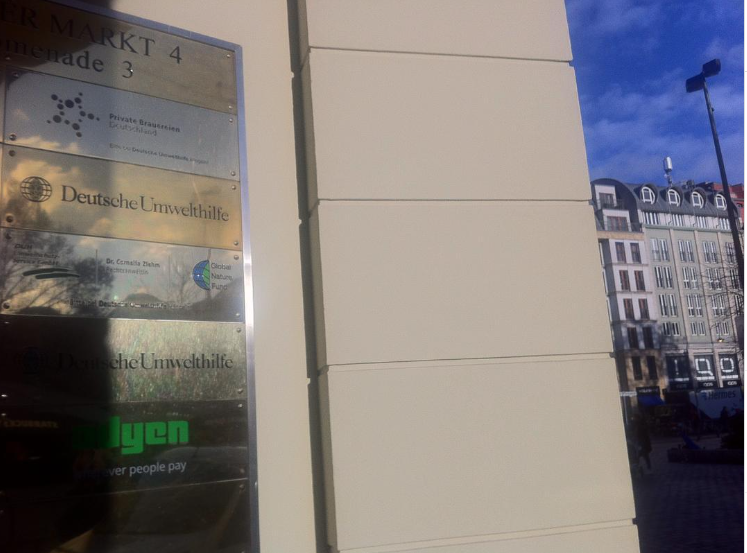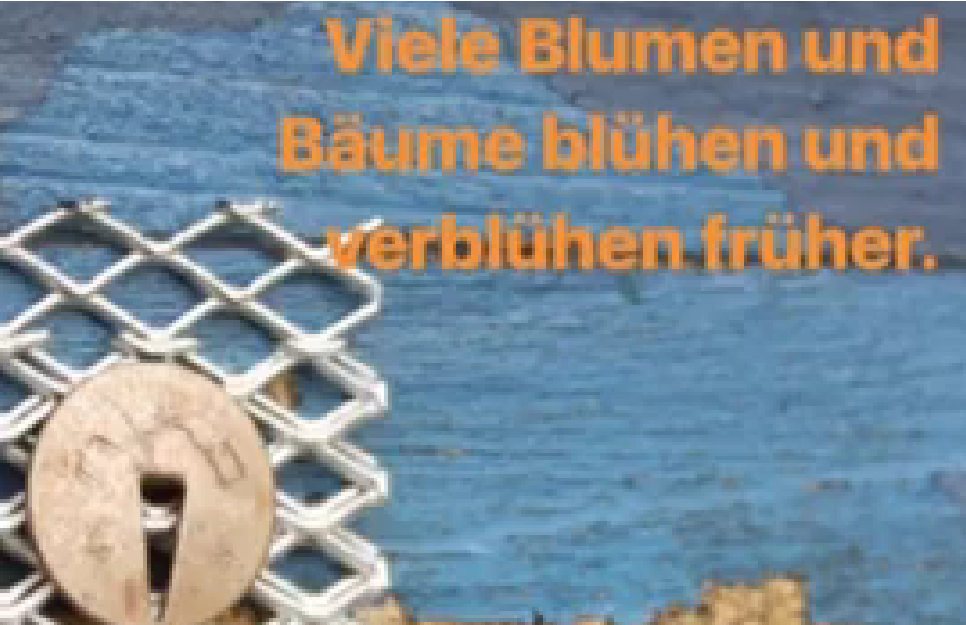Looking Beyond your Backyard
Ten men and women, who received EUKI-financed bursaries via the International Journalists’ Programmes (IJP), demonstrated just how exciting and varied environmental journalism can be. They spent eight weeks working in European partner countries and carried out research on climate change mitigation and energy transition. The result was 41 audio and written pieces from Croatia, the Czech Republic, Germany, Hungary, Slovakia and Slovenia . These are in the right-hand column and can be downloaded.

The articles cover a varied range of climate and energy topics. They include contributions on bioplastics in Bratislava as well as cycling projects, bee-keeping and dealing with nuclear power. The journalists visiting Germany were particularly interested in the plan to phase out coal power by 2038. Katja Lihtenvalner, Marina Kelava and Tereza Stastna provided their readers in Slovenia, Croatia and the Czech Republic with reports on the planned transition from coal and lignite to sustainable sources of power.

The Hungarian Gergely Nagy seized the initiative to look further afield. His report on energy transition in Germany won the Hungarian Energy Traders Association’s prize. In his report, he explained the energy transition clearly for Hungarian readers and analysed different aspects such as politics, society and the movement against nuclear power. Meanwhile, the German journalist Markus Meyer-Gehlen was on assignment in Hungary. Among the topics he reported on for the station WDR was the expansion of the Paks nuclear power plant.

Autumn 2019 sees the start of the second round in the exchange scheme for journalists. The participants are from Croatia, the Czech Republic, Germany, Hungary, Slovakia and Slovenia. Twelve more reporters can therefore gain experience on the spot and conduct research on climate and energy topics all over Europe.
Click through last year’s contributions and gain an impression of climate change mitigation as a pan-European task.
Publications
Marina Kelava (H-Alter, The Ecologist; Croatia)
“Mi smo priroda koja brani samu sebe” (Coal mining in the Hambach forest); Source: H-Alter
Njemačka termoelektrana najveći je pojedinačni zagađivač zraka u EU (German coal power plant and air pollution); Source: H-Alter
Klimatski pregovori: 24. pokušaj (UN Climate Change Conference COP24 in Katowice); Source: H-Alter
3 key ingredients to launch a bike kitchen (Voluntary bicycle repair service in Zagreb); Source: Shareable
Termoelektrane na ugljen: Europljani plaćaju milijarde za zdravstvene troškove (Repair Café in Berlin); Source: H-Alter
Bicikliranje mijenja svjetove(Bicycle courses for refugees); Source: H-Alter
Jens Cristof (MDR; Germany)
Slowakei plant Einführung von Einwegpfand(One-way deposit in Slovakia); Source: MDR
Bioplastik aus Bratislava (Bioplastics in Bratislava); Source: MDR
Dieselgate Diskussion in der Slowakei (Dieselgate discussion in Slovakia); Source: MDR
Katja Lihtenvalner (Vecer, Slovenia)
Črni časi za premogovno industrijo (Coal industry in Germany and structural change); Source: Vecer
Rudnike premoga bodo zaprli, vendar kdaj? (Structural change); Source: Medium
Proizvajalci si ne želijo nadgradnje starih dizlov (Interview with Dorothee Saar, DUH, on diesel driving bans); Source: Medium
Proizvajalci si ne želijo nadgradnje starih dizlov (Interview with Dorothee Saar, DUH, on diesel driving bans); Source: Vecer
Rudnike premoga bodo zaprli, vendar kdaj? (Structural change); Source: Focus.si
Markus Meyer-Gehlen (WDR, Cosmo; Germany)
Russische Abhängigkeit: Debatte um das Atomkraftwerk Paks (Debate about Hungarian nuclear power plant); Source: Deutschlandfunk
Atomkraftwerk Paks (Debate about Hungarian nuclear power plant); Source: WDR5
Gergely Miklos Nagy (Magyar Narancs; Hungary)
Atomerőmű darabokban (Safe shutdown of nuclear power plants); Source: Politika
Mire mennek atom nélkül? – A német gazdaság szénfekete foltja (Nuclear phase-out in Germany); Source: Magyar Narancs
Csak ne az udvaromba (Nuclear waste in Germany); Source: Politika
A széncsata (Nuclear phase-out in Germany); Source: Politika
Sabine Rossi (WDR, Cosmo; Germany)
Neue Schneekanone am Pohorje (New snow cannon at Pohorje); Source: RTV4
Besuch aus Deutschland (Interview about EUKI grant); Source: RTVSLO
Bienen verrücktes Slowenien (Bees in Slovenia); Source: WDR5 Quarks
Ski-Urlaub nachhaltig?! Geht das? (Sustainable winter holidays); Source: Cosmo Cities
Bienen verrücktes Slowenien (Bees in Slovenia); Source: WDR2 Weltzeit
Neugier genügt: Radtour unter Tage (Underground cycling); Source: WDR5
Bienen verrücktes Slowenien (Bees in Slovenia); Source: WDR2
Underground Biking (Underground cycling); Source: WDR2 Weltzeit
Unter Königinnen – Als Imkerin in Slowenien (Bees in Slovenia); Source: Deine Korrespondentin
Daniela Ivankova (RTVS; Slovakia)
Warschau und seine Bienen (Bees in Warsaw); Source: rbb
1500 Kilometer zu Fuß – Wandern für den Klimaschutz (Hiking to protect the climate); Source: rbb
Bericht aus Berlin (from 9:35) (Report from Berlin); Source: RTVS
Bericht aus Berlin (from 27:09) (Report from Berlin); Source: RTVS
Tereza Stastna (Czech Radio; Czechia)
How Germany’s coal phaseout is becoming an international movement; Source: Deutsche Welle
Living planet: When will Germany break up with coal?; Source: Deutsche Welle
How hard is a low-carbon lifestyle? A Berlin family tells all; Source: Deutsche Welle
Living planet: Personal climate action in Berlin; Source: Deutsche Welle
Living planet: Insects as a climate friendly alternative to meat?; Source: Deutsche Welle
Grit Eggerichs (Deutschlandradio; Germany)
Kroatien: Die Insulaner auf Krk wehren sich gegen ein Flüssiggas-Terminal (Liquid gas terminal in Krk); Source: Deutschlandradio
Nachhaltigkeit: Zugfahren ist geil (Train riding); Source: Deutschlandradio
Krk: Eine Insel kämpft für grüne Energie (Green energy in Krk); Source: WDR1
